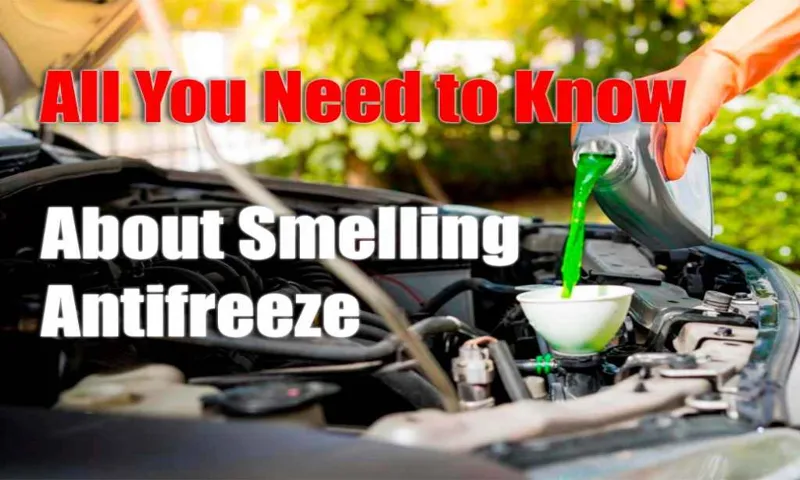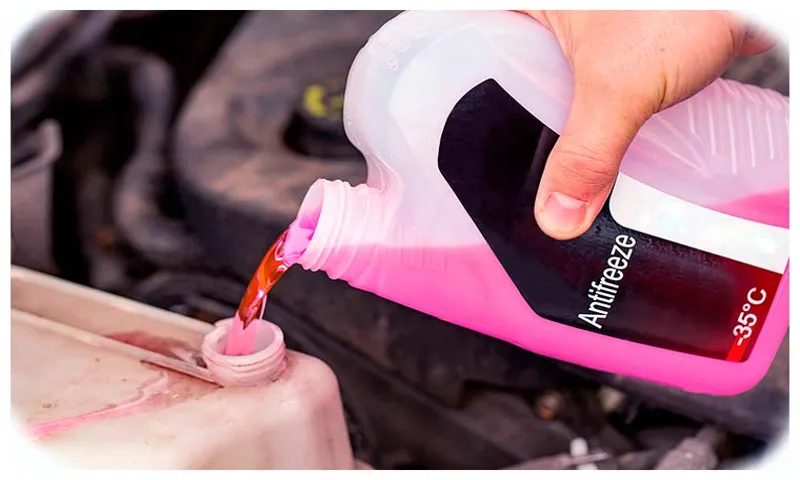If you’ve ever had to replace or add antifreeze to your car, you may have noticed a distinct smell. But does antifreeze have a smell, or is it just our noses playing tricks on us? The answer is yes, antifreeze does have a notable odor, and it’s not one you want to ignore. In fact, the smell of antifreeze can indicate a potential problem with your vehicle’s cooling system, such as a leak or a damaged radiator.
Understanding the smell of antifreeze and what it means can help you keep your car running smoothly and prevent costly repairs. So, let’s dive into the world of antifreeze and its distinctive scent.
Table of Contents
What is Antifreeze?
Antifreeze is a type of liquid that is added to a car’s engine to prevent it from freezing or overheating. But does it have a smell? Yes, most types of antifreeze do have a distinct odor, which can be described as sweet or almost syrup-like. The smell is actually due to the presence of ethylene glycol, which is the main ingredient in most antifreeze products.
Ethylene glycol has a sweet taste, which is why it can be dangerous if ingested. If you smell antifreeze in your car, it is important to locate the source of the leak and have it repaired immediately. Additionally, do not attempt to smell antifreeze directly as it can be harmful to your health.
So, to conclude, antifreeze does indeed have a smell, and it is important to keep an eye out for any leaks or unusual odors in your car.
Chemical Composition of Antifreeze
Antifreeze is a type of liquid that is added to the engine of vehicles to prevent freezing and boiling in extreme temperatures. It is made up of a chemical compound called ethylene glycol, which is commonly used due to its excellent thermal properties, low viscosity, and cost-effectiveness. Antifreeze also contains additives such as corrosion inhibitors, lubricants, and pH stabilizers, which help to maintain the engine’s integrity and prolong its lifespan.
This composition of antifreeze ensures that engines run smoothly throughout the year, regardless of weather conditions. So, if you’re looking to keep your vehicle running smoothly, it’s essential to select a high-quality antifreeze that contains the right balance of ingredients to protect your engine from damage caused by freezing or overheating.

Use of Antifreeze in Engines
Antifreeze is a vital component in engines that operate in cold climates. It refers to a liquid that’s added to the engine’s cooling system to reduce the temperature of the engine and prevent damage caused by freezing temperatures. The primary role of antifreeze is to maintain a constant temperature in your vehicle’s engine by regulating the engine’s coolant system.
Antifreeze contains a mixture of chemicals, including ethylene glycol or propylene glycol, that have anti-corrosion properties, preventing rust and erosion in the engine’s cooling system. Using antifreeze is critical in preventing the engine block from cracking or freezing during harsh weather conditions. Without antifreeze, the coolant water in the engine would freeze, and once a liquid turns into a solid, it becomes denser, which can lead to the rupture of the radiator, engine block, or water pump.
Therefore, adding antifreeze to your engine is crucial in preventing damage and prolonging the life of your engine.
Does Antifreeze Have a Smell?
Antifreeze is a common fluid used in automobiles to keep the engine and radiator from freezing in cold weather. It is typically made up of ethylene glycol and other additives to prevent corrosion and keep the engine running smoothly. One question many people have is whether or not antifreeze has a smell.
The answer is yes, it does have a distinct sweet smell, which can be dangerous if inhaled in large amounts. This smell comes from the ethylene glycol, which is toxic to humans and animals if ingested. It’s important to keep antifreeze out of reach of children and pets, and to take proper safety precautions when handling and disposing of it.
So, if you notice a sweet smell coming from your vehicle, it’s best to have it checked out by a professional mechanic to ensure there is no antifreeze leak or other issue with your engine.
Types of Antifreeze
Antifreeze, smell Antifreeze is a vital component in keeping a vehicle’s engine running smoothly and efficiently. It is a liquid substance that helps regulate the temperature of the engine while also preventing it from freezing in cold temperatures. But does antifreeze have a smell? Yes, it does.
Antifreeze often has a sweet, almost fruity smell, which can be both pleasant and dangerous. The sweet odor comes from the presence of ethylene glycol, an organic compound that is highly toxic if ingested. Because of this, it is important to always handle antifreeze with care and keep it out of reach of children and animals.
In addition to ethylene glycol, antifreeze may also contain other compounds like propylene glycol or glycerol, which may also produce distinct smells. It is important to use the right type of antifreeze for your vehicle, as different types may have different smells and chemical makeups. Always consult your vehicle’s manual or a trusted mechanic to determine the appropriate antifreeze for your engine.
Odorless Antifreeze
Antifreeze is a critical component that protects your car’s engine from freezing during the winter. But, do you wonder if antifreeze has a smell? The answer is yes; conventional antifreeze has a sweet odor, thanks to the ethylene glycol that’s present in it. However, there are odorless antifreeze options available on the market, which can be a great choice for those who are sensitive to smells or have pets in the house.
These odorless antifreeze options use propylene glycol as the primary ingredient, which is a safer and less toxic option than ethylene glycol-based antifreeze. Furthermore, propylene glycol-based antifreeze is more environmentally friendly and can be easily dissolved and recycled. Hence, if you’re looking for a safer, odorless antifreeze option, propylene glycol-based antifreeze products may be the right choice for you.
Antifreeze with a Sweet Smell
Antifreeze Antifreeze is a chemical substance that is added to the engine of a vehicle to prevent the engine from freezing in cold temperatures. It also helps to prevent corrosion and overheating of the engine. But, some types of antifreeze can have a sweet smell.
This is because some brands of antifreeze contain ethylene glycol, which has a sweet odor and taste. The problem is that ethylene glycol is highly toxic and can cause serious harm or even death if ingested by pets or children. That’s why some manufacturers are now offering antifreeze products that contain propylene glycol instead, which is less toxic and has a less sweet smell.
If you notice a sweet smell coming from your engine or radiator, it’s best to have it checked out by a professional mechanic to determine if there’s a leak or another issue. And always be sure to store antifreeze safely out of reach of pets and children.
Dangers of Inhaling Antifreeze
Antifreeze is a highly toxic substance that should never be inhaled. This chemical product is often used in automobiles to prevent engines from overheating, but it can also be found in other products such as ice melts and some cleaning agents. Does antifreeze have a smell? Yes, it does have a sweet odor that can be appealing to animals and children, but it can lead to incredibly harmful side effects such as kidney damage and even death if ingested or inhaled.
Inhaling antifreeze is particularly dangerous since it can cause serious damage to the respiratory system and even lead to lung failure. If you suspect you or someone you know has been exposed to antifreeze, seek immediate medical attention and never attempt to smell or taste it. Antifreeze may have a sweet scent, but its effects on the body can be anything but sweet.
Symptoms of Antifreeze Inhalation
Antifreeze inhalation is incredibly dangerous and can cause serious health complications. The symptoms of inhaling antifreeze can be difficult to identify, but some of the most common include headaches, dizziness, and lightheadedness. Many people may also experience nausea, vomiting, and difficulty breathing.
If you start to feel any of these symptoms after being exposed to antifreeze, seek medical attention immediately. Inhaling antifreeze can cause chemical pneumonitis, which occurs when the toxic chemicals in the antifreeze damage the lungs and cause inflammation. It can also damage the kidneys and liver and lead to long-term health problems.
Therefore, if you are ever in a situation where antifreeze is being used, it is important to take precautions to prevent inhalation, such as wearing a mask or ensuring proper ventilation. The dangers of inhaling antifreeze cannot be overstated, so always be aware of the risks and heed any warning signs.
Preventing Antifreeze Exposure
Antifreeze exposure can be dangerous and potentially fatal. Inhaling antifreeze is one of the primary ways that people can be exposed to its harmful chemicals. When antifreeze is heated, it emits toxic fumes that can cause dizziness, nausea, and even unconsciousness.
These symptoms can quickly escalate, leading to respiratory failure and death in severe cases. To prevent antifreeze exposure, it’s essential to handle the substance with care and wear proper protective equipment. Additionally, antifreeze should be stored in a secure location that is out of reach of children and pets, and any spills should be immediately cleaned up and properly disposed of.
Taking these precautions can help keep individuals safe from the dangers of antifreeze exposure.
Conclusion
In conclusion, does antifreeze have a smell? Well, while it may not be the most pleasant aroma, antifreeze is known to have a distinct sweet smell that can attract unsuspecting animals and even children. So, to answer the question, yes, antifreeze does have a smell, but let’s hope you never have to experience it firsthand. Remember, safety first, folks!
FAQs
1. What does antifreeze smell like? A: Antifreeze typically has a sweet, fruity odor. 2. Is the smell of antifreeze dangerous? A: Yes, the smell of antifreeze can be a sign of a leak and can be toxic if inhaled for prolonged periods. 3. How can I tell if my car is leaking antifreeze? A: Look for puddles of bright green or pink fluid under your car, or check the level of your antifreeze reservoir regularly. 4. Can antifreeze cause health problems? A: Yes, if ingested or inhaled in large amounts, antifreeze can cause serious health issues such as kidney damage or even death. 5. How often should I change my car’s antifreeze? A: It is recommended to change your car’s antifreeze every two to three years or as specified in your vehicle’s owner’s manual. 6. What should I do if I suspect an antifreeze leak? A: Take your car to a mechanic immediately to prevent further damage and potential health risks. 7. Is it safe to use antifreeze as a coolant in other applications? A: No, antifreeze is specifically designed for use in automotive cooling systems and should not be used in other applications. Consult the label for proper usage instructions.



